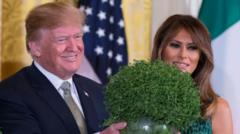This March, as St. Patrick's Day approaches, Irish politicians from both the Republic of Ireland and Northern Ireland gear up for their annual visit to Washington, D.C. This tradition, however, faces scrutiny as some Northern Ireland politicians announce their decision to skip the trip due to disagreements with President Donald Trump's policies. The significance of these events, held in the lead-up to St. Patrick's Day, raises the question of whether their absence would make an impact back home.
The key outcomes expected from the Washington trips include fostering U.S. investment and enhancing trade relationships. Steve Aiken, who has participated in these visits as the leader of the Ulster Unionist Party, emphasizes that building connections requires face-to-face interaction. "You cannot do it from 3,500 miles away," he asserts, highlighting the importance of personal engagement in political and business relations.
Reflecting on the potential rewards, former Sinn Féin politician Máirtín Ó Muilleoir underscores the fertile ground for Irish interests in the U.S. during St. Patrick's season, as many American businesses leverage the holiday for promotional activities. He anticipates upcoming announcements that could positively affect Belfast's financial services sector.
A notable highlight during the Washington festivities is when the Irish prime minister presents a bowl of shamrock to the U.S. president—an age-old tradition symbolizing the bond between the two nations, dating back to 1952. This high-profile gesture offers Irish leaders a unique opportunity to meet with U.S. leaders, reinforcing diplomatic ties.
Although the visits are said to cultivate better relations between Ireland and the U.S., experts contend that it is challenging to assess their direct impact on economic development. Economist Esmond Birnie points out that other factors, such as a skilled workforce and the regulatory environment, may weigh more heavily in attracting U.S. firms to Northern Ireland.
In the past, strong Irish-American figures like Senator Teddy Kennedy championed Irish interests in U.S. politics, but the changing demographics and reduced headlines from Northern Ireland necessitate renewed efforts to maintain American interest, as Aiken notes.
Notably, this year’s political landscape shines a light on divisions among Northern Ireland’s parties. Sinn Féin, along with the Social Democratic and Labour Party, plans to boycott the festivities in protest against Trump's stance on international issues, while the Democratic Unionist Party remains committed to attending. Ó Muilleoir believes that each political figure must navigate their own ethical considerations in this complicated atmosphere.
The key outcomes expected from the Washington trips include fostering U.S. investment and enhancing trade relationships. Steve Aiken, who has participated in these visits as the leader of the Ulster Unionist Party, emphasizes that building connections requires face-to-face interaction. "You cannot do it from 3,500 miles away," he asserts, highlighting the importance of personal engagement in political and business relations.
Reflecting on the potential rewards, former Sinn Féin politician Máirtín Ó Muilleoir underscores the fertile ground for Irish interests in the U.S. during St. Patrick's season, as many American businesses leverage the holiday for promotional activities. He anticipates upcoming announcements that could positively affect Belfast's financial services sector.
A notable highlight during the Washington festivities is when the Irish prime minister presents a bowl of shamrock to the U.S. president—an age-old tradition symbolizing the bond between the two nations, dating back to 1952. This high-profile gesture offers Irish leaders a unique opportunity to meet with U.S. leaders, reinforcing diplomatic ties.
Although the visits are said to cultivate better relations between Ireland and the U.S., experts contend that it is challenging to assess their direct impact on economic development. Economist Esmond Birnie points out that other factors, such as a skilled workforce and the regulatory environment, may weigh more heavily in attracting U.S. firms to Northern Ireland.
In the past, strong Irish-American figures like Senator Teddy Kennedy championed Irish interests in U.S. politics, but the changing demographics and reduced headlines from Northern Ireland necessitate renewed efforts to maintain American interest, as Aiken notes.
Notably, this year’s political landscape shines a light on divisions among Northern Ireland’s parties. Sinn Féin, along with the Social Democratic and Labour Party, plans to boycott the festivities in protest against Trump's stance on international issues, while the Democratic Unionist Party remains committed to attending. Ó Muilleoir believes that each political figure must navigate their own ethical considerations in this complicated atmosphere.

















